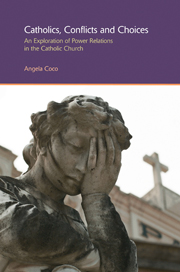Book contents
- Frontmatter
- Contents
- Acknowledgements
- Part I Experience and knowledge
- Part II Catholic experiences of power
- 5 Questioning the Catholic institution
- 6 Engaging with other Catholics
- 7 Managing one's self
- Part III Gender work in Christ's household
- Appendix: Profile of participants grouped into age categories
- Notes
- Bibliography
- Index
5 - Questioning the Catholic institution
from Part II - Catholic experiences of power
- Frontmatter
- Contents
- Acknowledgements
- Part I Experience and knowledge
- Part II Catholic experiences of power
- 5 Questioning the Catholic institution
- 6 Engaging with other Catholics
- 7 Managing one's self
- Part III Gender work in Christ's household
- Appendix: Profile of participants grouped into age categories
- Notes
- Bibliography
- Index
Summary
This chapter introduces Part II in which I explore the different ways participants experienced power relations. Their experiences were analysed and grouped into eight typical situation movement states: Barrier, Decision, Wash-out, Effete, Problem, Spin-out, Drifting and Tightrope situations. Each SMS is illustrated with a short version of one person's conversation with me. These excerpts are used to explore how aspects of the Catholic gender regime may be discerned in the practices and interactions that affected people. The first thing you may notice is that often people do not mention gender. This is because gender is not part of our conscious thoughts so much, but contours the limits of freedoms, choices and actions that are available to us. When we find ourselves on the feminized side of a situation, we will also be in a subordinate position subject to power relations that are difficult to negotiate.
People describing incidents typically focus their stories in a particular way. For instance, some people will talk about the “Church” or “Catholics” as a group or collectivity of people who appear to think and act as one. Others may focus on particular individuals and their interactions with them, while the third way of making sense of a situation is to focus on one's inner self and how one tries to align external pressures with internal beliefs and personal experiences. I have organized this and the next two chapters by grouping people's narratives according to the frames they used: self-relating-to-collectivity, self-relating-to-other-Catholics, self-relating-to-self.
- Type
- Chapter
- Information
- Catholics, Conflicts and ChoicesAn Exploration of Power Relations in the Catholic Church, pp. 87 - 136Publisher: Acumen PublishingPrint publication year: 2013



